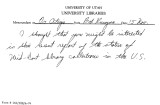| Title |
Report on library services that support Middle East studies dated July 1974 |
| Contributor |
Runyon, Robert S.; Atiya, Aziz Suryal, 1898-1988 |
| Publisher |
Digitized by J. Willard Marriott Library, University of Utah |
| Date |
1974 |
| Subject |
Middle East -- Study and teaching; University of Utah. Libraries. Middle East Library; Library collections (Materials); Library acquisitions; Library administration; Library administrators |
| Description |
p.1-14 A portion of "Library services in support of international education : a report submitted to the government/academic international education interface committee by the task force on library and information resources, July, 1974." Includes primarily the portion on Middle East studies. p. 15-17. Notes from Robert S. Runyon to Aziz Atiyah regarding the above report |
| Type |
Text |
| Genre |
Reports |
| Format |
application/pdf |
| Collection Name |
0480_018_002 |
| Collection Number and Name |
0480_018_002 Aziz Suryal Atiya Papers |
| Language |
eng |
| Rights |
 |
| Relation |
http://archiveswest.orbiscascade.org/ark:/80444/xv99560 |
| Conversion Specifications |
Original scanned on Epson Expression 10000 XL and saved as 400 ppi TIFF. Display image generated in CONTENTdm |
| Scanning Technician |
Niko Amaya |
| File Name |
0480_018_002_Holding_Report_Stapled_Set_03.pdf |
| ARK |
ark:/87278/s6h42j6m |
| Setname |
uum_asap |
| ID |
779894 |
| Reference URL |
https://collections.lib.utah.edu/ark:/87278/s6h42j6m |





















